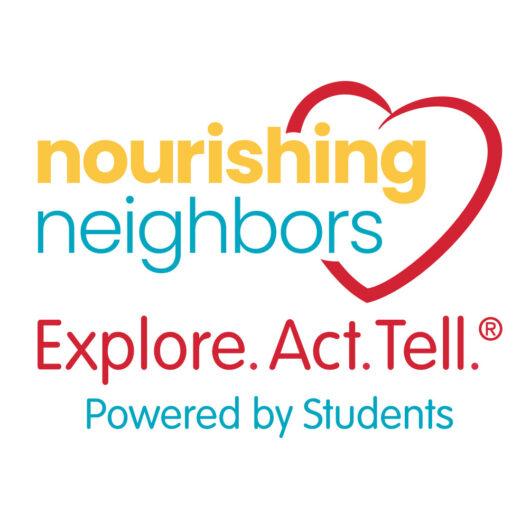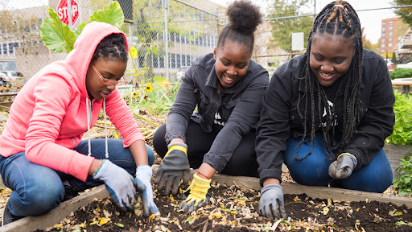Here are 10 project idea starters. Using the lessons, all of these can be accomplished between now and the June 3rd deadline. What a great way to try Explore.Act.Tell. and be fully ready for next year too!
- Arrange a video call with your local Food Pantry. Have students write questions in advance based on what they learned from their Exploration in Lesson 1. After the call, have students create flyers to promote ways students and families can best assist the food pantry. Have the school send the flyers out in the next school communication to parents.
- Schedule a Service Day. After students complete Lessons 1 and 2, they will be ready to activate their ideas in a Day of Service. This can be done in the community or right at your school. Work with a local hunger organization to donate students’ time to the organization’s needs.
- Host a schoolwide or Districtwide “Before You Go” Collection Drive toward the end of the school year. Invite students to bring in a food item (get a list of needs from your local hunger charity). Create prizes or celebrations for classes or students based on goals.
- Host a schoolwide “Miracle Minute.” Announce a time in the day when you will pause classes for one minute. Anyone can contribute change (or dollars) in their classroom. All money will be collected and donated to a local hunger organization. Celebrate the top classes with a follow-up announcement.
- Host a Produce Drive in your school. Designate a day when students and teachers can bring in fresh fruits or vegetables to donate to your local food bank. Work with the food bank in advance to access a list of acceptable items. Create prizes or recognition for top class, student and administration donations.
- Create and implement a Take a Senior to Lunch Day. Work with a local senior center to join the senior citizens at their location (a senior home or community center) or bring them to the school cafeteria. Have students connect with seniors and eat lunch together. Students can create a list of questions in advance to learn more about the senior citizen and their favorite foods. Create a video from the event and what students learn.
- Take on the Challenge of encouraging Healthy Habits. After doing their research, students can create a book or video for elementary students on ways to choose healthy eating habits. Take the story book or video to local elementary schools and share it live. Bring samples of foods and items mentioned in the story.
- Schedule a Donation Drive By. Have students get permission to promote a day when they will collect food donations from the morning and afternoon drop-off/pick-up lines. Families can donate food items when they are in the school line and students can donate to a local food pantry.
- Host a Summer Send Off. Ask the school’s coordinator of the Backpack or Weekend Food Program to identify the number of participants. Collect boxes of individual food items (i.e. – bars, cookie packs, nuts, snack items) to be able to donate one box to each participant as a Summer Send Off. This gives the student and their family some fun foods to have during the summer. Note: This can all be done with respect for privacy through the school’s coordinator.
- Create a “Charge Your Batteries” Food Table. Have students gain permission for a designated place in the school to have available snacks. Host a snack foods collection drive for donations. When students (or teachers) need to “charge their batteries” they can grab a snack item to have during the school day.
Special Note: For any of the food collection ideas, be sure to contact your local Acme, Shaw’s or Star Market location to invite them to join your team in donating items. We are all in this together through their Nourishing Neighbors program which funds Explore.Act.Tell.

